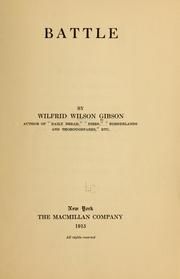Reilly 139. Book not in Reilly.
Gibson, Wilfrid Wilson (1878–1962), poet, was born on 2 October 1878 at Hexham, Northumberland, one of the younger children in the large family of John Pattison Gibson, chemist, of Hexham, an amateur archaeologist and photographer of note, and his wife, Elizabeth Judith Frances Walton. He was educated at private schools and by his sister, Elizabeth Gibson Cheyne (1869–1931), herself a published poet, who encouraged him in his wish to write poetry. He started writing in his early youth and, except for his war service, devoted his whole life to it. He never attended university. His early volumes of poetry were highly romantic. In The Stonefolds (1907) he first approached the central theme which characterizes his poetry: the lives of ordinary people. It was with Daily Bread (1910) that he achieved fame as the poet of the ‘inarticulate poor’. After this, in some thirty books of verse-plays and long and short poems, he wrote of the poor of town and country in a plain idiom that reflected their plain speech; he spoke for and aroused sympathy for the northern people among whom he had grown up. He was admired by some of the best poets of his time—(Philip) Edward Thomas and Robert Frost, as well as Rupert Brooke.
In 1912 Gibson moved to London, which was crucial for his career, as he lived above Harold Monro's Poetry Bookshop and met John Middleton Murry and Katherine Mansfield, who introduced him to the patron Edward Marsh. Gibson became a contributor to Marsh's five volumes of Georgian Poetry (1912–22).
Through Marsh, Gibson met the young Rupert Brooke, and with him and others brought out the short-lived quarterly, New Numbers, which printed in December 1914 the ‘War Sonnets’ that made Brooke's reputation as a war poet [see Dymock poets]. One result of this collaboration was that Brooke bequeathed to Gibson, Lascelles Abercrombie, and Walter de la Mare a third share each of his property, including the proceeds of his poems—which sold in unprecedented numbers in the decades following Brooke's death on the Greek island of Skyros in April 1915.
In late 1913 Gibson married, in Dublin, Geraldine Audrey Townshend (d. 1950), Monro's assistant in the Poetry Bookshop and daughter of Charles Uniacke Townshend, land agent, of Dublin. They moved to Gloucestershire soon after. Brooke's legacy enabled Gibson to live as a poet, never following another profession, although in later days his wife sometimes had to take in paying guests.
In the first years of the war Gibson made several attempts to enlist, but was turned down because of his poor eyesight. American enthusiasm for Brooke was partly reflected in an invitation to Gibson to lecture, and his US tour in 1917 was prolonged and successful. Macmillan, New York, published Gibson's Collected Poems. Also in 1917, he was accepted by the Army Service Corps, where he served until 1919. His writings of this time include the well-known war poem entitled ‘Breakfast’ (which appeared in The Nation on 17 October 1914). In this and ‘The Return’ he showed his compassion for the ordinary man and woman, and in ‘The Lament’ he wrote movingly of ‘the heartbreak at the heart of things’ (W. W. Gibson, The Lament).
Gibson's Collected Poems was published by Macmillan, London, in 1926, and this collection, based on twenty earlier books, is impressive for its variety, as well as for its length of nearly 800 pages. This included perhaps his most enduringly popular poem, ‘Flannan Isle’ (1912), which evoked the scene of the mysterious disappearance in 1900 of three lighthouse keepers on a remote outcrop in the Outer Hebrides. He published some fourteen more books—including four during the Second World War—with titles, like The Alert (1941), which showed his continued preoccupation with war.
After 1926 Gibson's literary standing fell: Robert Frost was concerned about it as early as 1928. He had built up his reputation as the spokesman for the inarticulate poor, and lived on into a time when a self-conscious working class preferred to speak for itself. He also tended to write too much and revise too little. Too many of his longer passages lack the liveliness of ‘Hoops’ (1914), or the sheer compulsion of ‘Drove-road’ (1917).
The Gibsons suffered the tragic loss of their daughter Audrey in a landslide in Italy in 1939. They lived in Gloucestershire, in Pembrokeshire, and round about London, but never in Northumberland, the county that remained Gibson's inspiration. Geraldine Gibson died in 1950, the year of Gibson's last book, Within Four Walls, and Gibson himself died at Holloway Sanatorium, Virginia Water, Surrey, on 26 May 1962. A second daughter, Jocelyn, survived him, as did a son, Michael, who published over thirty books, including some on his special subject, the history of roses.
R. N. Currey, rev. Sayoni Basu, Oxford Dictionary of National Biography
